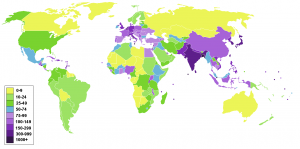 Human population growth, now sitting somewhere in around 6.7 billion people, is often thought of as an exponential process. The year 10,000BC saw a global population of one million people, fifty million by 1000BC, then three-hundred-ten million by 1000AD, and a full billion by 1800. In 1900 there were 1.6 billion people and by the new millennium the global population was just over six billion. But this growth is not actually exponential; it’s just that we tend to breed a lot. In spite of the fact that most anthropologists predict a global population of somewhere near 10 billion people by the year 2012 (convenient considering we’re all supposed to die in 2012), population growth rates in developed countries are actually negative.
Human population growth, now sitting somewhere in around 6.7 billion people, is often thought of as an exponential process. The year 10,000BC saw a global population of one million people, fifty million by 1000BC, then three-hundred-ten million by 1000AD, and a full billion by 1800. In 1900 there were 1.6 billion people and by the new millennium the global population was just over six billion. But this growth is not actually exponential; it’s just that we tend to breed a lot. In spite of the fact that most anthropologists predict a global population of somewhere near 10 billion people by the year 2012 (convenient considering we’re all supposed to die in 2012), population growth rates in developed countries are actually negative.
These growth rates are the result of a calculation of the difference between birth and death rates, wherein a positive growth rate is the result of a higher birth rate than death rate, and transversely, a negative growth rate is the result of a lower birth rate than death rate. Ideally speaking, a neutral growth rate is utopian for any society. As many children being born as there are people dying, leaving stable numbers of attrition and replacement in each sector of development and occupation. An obvious advantage to overall stability, though as mentioned, growth rates in first-world nations, as opposed to developing nations are negative (and falling, I might add). Translating to potentially unstable attrition rates as the bulk of the population nears an age of occupational retirement and social dependence. The process is two-fold devastating on social hierarchy, in that the bubble of experiential wisdom achieved by older generations is inefficiently shared with the replacement generations and as a result occupational expertise dwindles. Secondly, the shift of the majority populous into states of growing social dependence precipitates an increase in new positions for which occupational expertise has yet to be developed, not to mention the strain of supporting such a huge population of the occupationally inert. Both of these ideas contribute to a notion that the middle of this first century in the new millennium has a bleak prospect for overcoming expertise driven scientific, social and political problems, especially so when the sad state of western education systems is factored in.
However, these nations don’t live in a vacuum; they are offset by the positive growth rates of developing nations, through immigration and outsourcing, and subsequently, a detailed look at national growth rates offers only a skewed, nationalistic perspective. On the whole the global population, in spite of the mixed national growth rates, is positive (this is most definitely not a value judgement). On a global scale we continue to produce more people than are dying, in spite of the wide variety of ways in which a person can die these days.
War, terrorism, famine, natural disaster, crime, disease and old age, are apparently not enough to counter-balance what seems to be an almost unnatural predilection for humans to breed uncontrollably. There are many reasons for positive growth rates in developing nations, some competing and contradictive, others counterintuitive to say the least. Religion, the oppression of women’s rights, and even regional famine are just a few ideas that can easily explain increases in family size over poverty stricken nations, and coupled with, or perhaps entangled with these ideas (and many of the other socioeconomic ideas associated with the third world) is the anthropocentric notion that the global human population on the whole has some further obligation to help nudge these growth rates to ever more positive scales through “humanitarian aid”.
Now, this is not to say that a general sense of charitable obligation toward our own species is undesirable. This is simply meant to highlight a particular underlying idea, or rather a train of ideas. Humanitarianism is thought to be, at least by those who participate in it, an altruistic endeavour. But both for hidden and even unintended reasons of personal or societal gain, it truly cannot be viewed as such.

A visual representation of global population (scale is arbitrary)
The human population explosion, in which we are still participating, is like most other explosive processes, a destructive cycle. The larger the population within a finite environment, the faster the resources of that environment will disappear. Because of our quickly rising population, we are facing a global food and water shortage, not to mention a global energy crisis. And yet our population continues to increase unchecked at almost exponential rates. All the while we continue to work feverishly, albeit indirectly, at increasing these numbers even further. The proliferation of medicines to disease ravaged nations, the outpouring of charitable donations for natural disaster victims, the rolling in of agricultural and engineering resources for nations considered to be underprivileged in terms of education and economic representation. Each of these efforts serves to extend the life span of those who are indigenous to these developing nations and in turn is serving to drastically increase the population growth rates of each nation and ultimately the planet.
Why, you might ask, shouldn’t they have just as much right to each and every one of these charities as anyone else, and even more? No one is saying they shouldn’t mind you, but the simple fact is the more of them that survive, the worse our situation gets, globally speaking. Cruel hearted as this sounds, there is logic here, but, and to the relief of at least my email inbox, this is not the end of the story.
There is a key idea here that many who think of these issues will miss. Third-world countries are contributing, wildly, to our global population growth rate, and hence contributing in large part to the overall shortage of global resources, while first-world nations are actually showing population decline, and despite the fashionably popular notions of a super-sized America, are actually less of a burden, on a per populous basis, to those same resources (not including fossil fuels, of course). The short sighted answer to the global food and water resource problem is to cut off aid for those countries that refuse to limit their population growth. The right answer though, might be, to increase aid for those developing nations, in an unprecedented effort to boost their overall quality of life to that of the so-called first world nations.
Widespread public education, social support systems, as well as medical, engineering and permanent agricultural resources; when one considers what it may have been that ultimately contributed to the correlated (and some would argue illusory) high standard of living and acceptably low rate of population growth in developed countries like the US, one has difficulty nailing down a single idea. Nevertheless, when thought of in these terms the answer is almost too simple to deny.
An unexpected possibility comes out of this argument though; one that may not sit well with the long standing notion that international outsourcing is destroying the North American economy. A necessary effect of deliberately and drastically raising the standard of living for developing nations is an increase in that particular nation’s gross national product (GNP), and that is done in no other way than to create industries and jobs with which to sustain a working economy of their own. Now, as western society is unwillingly, or perhaps, unwittingly moving toward an information based economy, rather than an industrial or even service based economy, the fact (sad or otherwise) is that international outsourcing is the single most efficient means for cultivating emerging economies in these nations.
And while there are many people, uninformed or ill-informed as they are, who would vehemently oppose such an idea, it can scarcely be denied that these steps are unavoidably connected (at least based on the population scales we seem intent on maintaining), for the alternative seems, while pragmatic, to be unthinkable.
 Some may already see where this is headed, and those familiar with my own predilection for this idea may already have jumped ahead. What we’re talking about here is nothing more than the natural evolution of global culture. Nations develop; they emerge, they grow, they begin to participate and they develop. Ultimately they develop into an international partner alongside other fully developed nations (as though there is some deep meaning to the term “fully developed”, beyond simply saying that they are no more or less developed than any other nation). When I mention that humanitarian aid is both necessary and in some respects damaging, I am not suggesting that the participants have any control over it, or that they should discontinue their crusade. When I say that efforts should be undertaken to raise the GNP of developing nations, I’m not suggesting that a third-world development committee be formed to oversee their progress (though the UN has made a valiant effort). No, I’m simply pointing out that this process is necessary, what I haven’t pointed out is the fact that it’s happening, right now, whether we want it to or not. It is simply a function of humanity’s social evolution. It is no more stoppable than was our Darwinian departure from our ape cousins…its happening, get used to it.
Some may already see where this is headed, and those familiar with my own predilection for this idea may already have jumped ahead. What we’re talking about here is nothing more than the natural evolution of global culture. Nations develop; they emerge, they grow, they begin to participate and they develop. Ultimately they develop into an international partner alongside other fully developed nations (as though there is some deep meaning to the term “fully developed”, beyond simply saying that they are no more or less developed than any other nation). When I mention that humanitarian aid is both necessary and in some respects damaging, I am not suggesting that the participants have any control over it, or that they should discontinue their crusade. When I say that efforts should be undertaken to raise the GNP of developing nations, I’m not suggesting that a third-world development committee be formed to oversee their progress (though the UN has made a valiant effort). No, I’m simply pointing out that this process is necessary, what I haven’t pointed out is the fact that it’s happening, right now, whether we want it to or not. It is simply a function of humanity’s social evolution. It is no more stoppable than was our Darwinian departure from our ape cousins…its happening, get used to it.
This idea though is somewhat disconcerting to a great many people, myself included, that we’re no longer in control of our own development (as though we ever were, or even ever will be), that we cannot take control, at least of some aspect(s) of that development on a global scale. There are those though, who suggest we can do just that, but now, what might we need in order to do such a thing?
Global governance is what we need, plain and simple; well actually it’s not even remotely plain, or simple for that matter. Imagine that, if you will, humanity, finally realising that we’re all…human. An anthroposphere, as coined by Harvard Social Scientist Nicholas Christakis. A planetary population no longer separated by questions of border, and property and ownership. This is by no means a suggestion that any one culture on earth should be overshadowed by those next door, not in the least. In fact this is the suggestion that cultural differences should be celebrated for what they actually are instead of the caricatures of what national borders make them out to be. We should be a population of humans, working in concert to propel humans into the future, not a fractured and bitter collection of ever poorer nations, whose pastimes amount to petty games of one-upmanship. Idealistic as this may seem, even unrealistic to some, Global Governance extends directly from the fact that the coming years, decades and centuries will yield many, many more voices to be counted on issues that affect our global population. It can’t be avoided that we will need a group of globally minded people to listen to all those voices, and ultimately decide what social, political and economic choices are best for the entire planet.
In case you missed it, this is actually a proposal for a New World Order; you know that dark and shadowy and frightening monster hiding in the dark corners of Doctor Evil’s laboratory, or should I say, in the closets of the world’s military-industrial complex. As much as there may be (or more likely is not) a conspiratorial group of neo-political superpowers teaming with ideas of world domination, the reality of our social evolution is that 10 billion people cannot govern themselves in such a fractured political structure as we have today. A unified global government is absolutely necessary for our survival on a global scale. But for those who might argue this point, I shall offer what may amount to a crushing blow. Just as the economic development of third-world nations is occurring all on its own, so too is the creation of a New World Order, by way of changing attitudes toward what it means to be human. In this regard, we are our own worst enemy; our populations increase at an almost exponential rate, which means, unavoidably, that we produce a new globally scaled generation of humans every two decades or so. Even if you’re not familiar with neo-Darwinism, you’ll have to concede that evolution has no preference for our political structures. Our children will do whatever our social evolution demands of them, which means that this never was a discussion of what we should undertake, it was, from the beginning, an examination of what is most likely to come anyway.
In the end, it’s our children who will decide how to move forward, though as history tells us, forward movement is seldom planned to any great degree, it just happens, much like the development of those third world countries. Those particular nations need to be developed, as much as you need to eat, hence they do develop; global governance is a necessity that rivals even our super-sized appetite.
